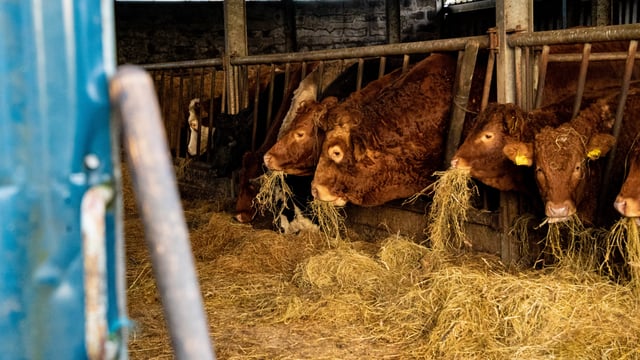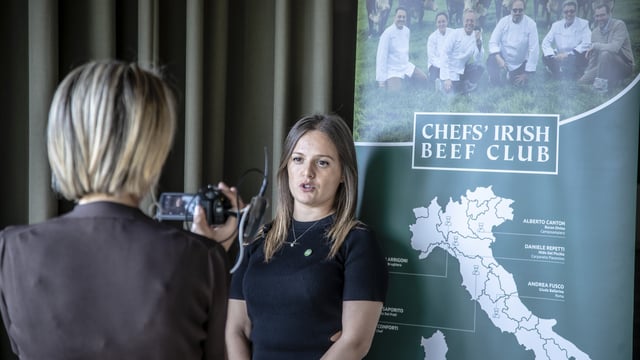Watch: The rise of the Cooley Sheep Breeders - 24 years since the cull
What the Cooley Sheep Breeders have collectively achieved in the past two decades is no small feat.
The group of sheep farmers on the Cooley Peninsula in Co. Louth have managed to return from having every sheep on the peninsula culled in 2001, to hosting annual production sales featuring over 3,000 breeding sheep in recent years.
Agriland caught up with the Cooley Sheep Breeders' Association ahead of its annual sale, which takes place this coming Saturday, September 6, in Carlingford, Co. Louth.
Thomas Elmore of the Crossbrae Cheviot Flock is involved in the Cooley Sheep Breeders' Association and explained how the association has got to where it is today.

He said: "It's just over 24 years ago now since we had the mass culling of healthy flocks in the Cooley Peninsula - all in the national interest.
"We had a confirmed case of foot and mouth in early 2001 and it devastated the whole area because, due to the exclusion zone and proximity to that confirmed case, all flocks and some cattle herds had to be culled in the national interest to eradicate the disease.
"This caused devastation across the whole peninsula, because every farmer had to start from scratch again.
"We had to go back out - when exclusions were lifted - and we had to restock. And that took time. And certainly in terms of our system with hefting on our mountain here under Sliabh Foy, that took a lot longer than maybe for some lowland breeders."
Sliabh Foy covers an area of approximately 1,000ha. An important process for hill sheep is the hefting process, where one generation of sheep trains the next to stay on certain areas of the mountain, and also allows for immunity to tick bites to be passed on to lambs.
After the cull, all this was all lost and had to be built up again from scratch.
The resilient group of hill sheep farmers did not let the devastation of the cull get the better of them.
The farmers started out again from scratch and rebuilt their flocks - a process which took years, given the environment being grazed and the loss of the natural immunity and flocks' knowledge of the mountain.
Elmore said: "I suppose it's the positive spin on everything - we got through it.
"For a lot of us, our ethos was to get back to where we were pre-cull - that's what the ethos of all the local farmers was.
"And it's a nice spin that some 10 years after that devastating incident that happened here in the Cooley mountains - that the Cooley Sheep Breeders' Association was set up to have a local sale for the premium-quality, hill-bred sheep here in Cooley, Co. Louth.
"The new-age organisation that we're part of now was a reinvention of an older, Cooley Sheep Breeders' Society that ran in the 1980s and 1990s.
"The sale is the culmination of a year's work for a lot of our farmers," Elmore added, explaining that a lot of the farmer-members have adapted their flocks to suit the buyers that come to the Carlingford sale.
The sale is predominantly commercial sheep but in recent years also added a selection of pedigree sheep. It is also composed of several breeds rather than one single breed.
Cooley Sheep Breeders' Association chairperson
Gerry McEnaney is the chairperson of the Cooley Sheep Breeders Association.
He explained that the sale on Saturday, September 6, will feature over 3,000 breeding sheep, of which 2,000 will be ewe lambs, and 1,200-1,300 hoggets.

He said that the sale this Saturday marks the 15th year of the event.
The first sale took place in 2011 with approximately 50 members in the association.
The membership has now grown to about 120 sheep breeders on the peninsula that all produce breeding sheep for the sale.
Commenting on his own sheep-farming system, McEneaney said: "We run a system here with Cheviot and Cheviot-mule ewes."
He said that in this year's sale, he has an entry of Cheviot-mule Suffolk-cross ewes, adding that "they do well for us every year with plenty of customers coming back looking for them."
The group's chairperson said that free haulage transport is provided for all sale customers all over Ireland after the sale.
John Wehrly
Well-known sheep breeder John Wehrly has been involved in the Cooley sheep breeders for the past 15 years.
His own flock includes mostly horn ewes and are a mix of Lanark and Swaledale-cross.

He said that the sale was founded as a means to promote the sheep produced on the peninsula.
With the help of Carlingford-based auctioneer Owen V. Woods, who owns the field where the sale is hosted as well as liaising with Teagasc and the Department of Agriculture, Food and the Marine (DAFM), the association was granted a licence to host a one-day outdoor sale in the field in Carlingford on the first Saturday in September every year.
The sale is facilitated by Ballybofey and Stranorlar Co-operative Livestock Mart, with online bidding avaliable on MartEye.
"We got together a bunch of us, and we put together a group of guys - now probably getting famous in the world of sheep breeders, and it's just gone from strength to strength."
"It's unique in that we're the only outdoor sale in the country and secondly, it's a closed kind of thing to the Cooley sheep breeders, so there's no dealers sheep.
"They're all reared on the Cooley peninsula on these hard hills here behind us or they're bought in as ewe lambs the previous year," Wehrly said.
Commenting on the sheep breeds in the sale, he said: "Mostly on the hills, you probably have a mixture of Lanark, Swaledale, Perth, west of Ireland-type horn sheep and then you have Cheviot sheep from your Wicklow Cheviot and the North Country Cheviots and Park-type Cheviots, and it's the crosses of those sheep that's been sold, predominantly at the sale."
"There's parts of Cooley that has a bit better ground than others and there's hoggets kept, and reared on the lowland in Cooley, and they are real strong-type hoggets."
Wehrly also praised the "fantastic group of young people" involved in the sale.
He said a lot of young people grow a real interest in farming from the excitement around the annual sale and many go on to study agriculture afterwards.
"And thankfully, the sale is going from strength to strength year-on-year," he added
The sale takes place on Saturday, September 6, with over 3,000 hoggets and ewe lambs set to be offered for sale on the day and free haulage to buyers all over Ireland.





